Nada, Zip Nada
No story this morning. I (had) fourteen minutes before the inexorable clock has me out the door for the wilds of Chantilly and an important meeting that requires my physical presence. I got up in time- yet still couldn’t get it together.
I was going to weave a tale about the new alarmist report of the global temperature trends newly revealed by a team from Oregon State and Harvard Universities. It turns out that the last 6,000 years have featured temperatures that are warmer than they are now, at least a quarter of the time, at least in the two places where they drilled the core samples, and yet they managed to sound another note of alarm.
The New York Times (which ran the story) rang up faux Nobel Laureate Dr. Michael “Hockey Stick” Mann to get some quotes to close the article with the proper note of alarm. “It is really, really scary and the last hundred years shows an acceleration in the temperature that is really really unusual and will require billions more in research.”
OK, I may have paraphrased that quote, but we have heard a lot from the Good Doctor since he published the famous projection of wildly rising temperatures that will boil the oceans and turn the planet into a Venusian equivalent.
Yawn. The temperatures have not gone up in the five most respected global temperature databases in somewhere between eight and seventeen years, and no more than the margin of error in almost a quarter century, despite the earnest tinkering with existing data by the alarmists.
1934 remains the warmest modern year, with the most severe weather regardless of what they do to “adjust” the past to comport better with the theory and the computer models based on it.
There is something going on, to be sure. The Pacific ENSO phenomenon is warming places on the rim of the great ocean. Other places are cooling. Gaea’s orbit wobbles. This is much larger than we are, and it is hubris of the greatest sort to attribute everything to human activity.
Permit me to file this one in the non-issue file.
Copyright 2013 Vic Socotra
www.vicsocotra.com
renee lasche colorado springs
The Problem with Pitchers
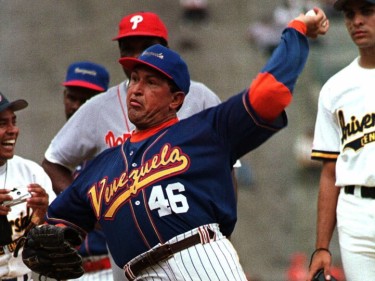
(Pitcher-in-Chief Hugo Rafael Chávez Frías, 28 July 1954 – 5 March 2013. RIP.)
I think that from the time I left the academy I was oriented toward a revolutionary movement… The Hugo Chávez who entered there was a kid from the hills, a Ilanero with aspirations of playing professional baseball. Four years later, a second-lieutenant came out who had taken the revolutionary path. Someone who didn’t have obligations to anyone, who didn’t belong to any movement, who was not enrolled in any party, but who knew very well where I was headed.
– Hugo Chávez
I am going to have to let that bloated idiot Michael Moore lead the Hollywood progressive chorus in fulsome praise for the departed bantam dictator of Venezuela. Moore was echoed by the usual deranged celebrity crew: Sean Penn, Oliver Stone, etc etc.
It is funny, really. Stone featured President Bush’s passion for baseball in his bio-pic W. He didn’t mention a thing about the emotion Mr. Chavez had for the national pastime.
The loss of Mr. Chavez sent ripples across the celebrity universe. One of the constellation of stars who is going to have to make some decisions is political dynasty star Joseph Kennedy, whose fuel-oil give-away from the Chavez oil giant CITGO is imperiled. It was a great program designed to tweak the nose of the Yankee oppressors.
I know what I think about the departed strongman. I think it is a problem with pitchers. You are aware of the passion with which Venezuelans follow their national past time, and Mr. Chavez was no exception. There was a fork in the road for him, as profound as a fluttering knuckleball: the mound, and a dream of playing for the San Francisco Giants, or something else?
Hug’s pal Uncle Fidel wanted to play for the Yankees, the story goes, though there is some legitimate controversy about how much heat the future dictator had on his fastball, and whether the Washington Senators or the New York Yankees had any real interest in the hurler-turned-strongman.
There was no doubt about Hugo. He went into the army to pitch, and had it not been for an injury to his throwing arm, we might have seen him have a so-so career in the Big Leagues, perhaps being a scout or a coach today, well compensated in the US.
Before leaving for the island paradise for treatment of his pelvic cancer, Chavez rejoiced at the Venezuelan contingent who played in the 2012 World Series.
A total of nine players from the Giants and Tigers were Venezuelan nations, and Mr. Chavez mused that President Obama might have to relinquish control of the Fall Classic to someone who actually cared about the game.
AP claims Mr. Chavez asked the rhetorical question: “What would the major leagues do if Venezuela didn’t exist? They’d get bored. I think the next World Series, Obama, you’re going to have to play it here in Venezuela, because it’s Venezuelans all over the place.”
It was well-known that far into his fourth term as Bolivarian Socialist President, Mr. Chavez would make his first call of the day to Luis Sojo, manager of Venezuela’s national team. After one World Baseball Classic game, Chávez rang up the manager to ask why Sojo had not used his closer, Francisco Rodriguez, during the middle innings when Venezuela had given up a lead.
In August 2010, Chávez phoned Rodriguez direct, because the hurler had been arraigned on assault charges against the grandfather of his children after blowing a save at Citi Field. Chávez told Rodriguez that Venezuela was proud of him but also said, “Calm your impulses.”
The Miami Herald’s Manny Navarro got to the drama at the exhibition game against the Florida Marlins on Tuesday. The Venezuelan national team requested a moment of silence on behalf of their First Fan. Major League Baseball demurred, though a sense of ambiguity survived the slight: the Venezuelan national flag stood at half staff for several minutes while the team took batting practice, though by the time the teams took the field the flag was at full staff again.
It was not outright disrespect, maybe a nod to a shared passion for the game. A spokesman for the Venezuelan team told reporters the country’s minister of sports, Hector Rodriguez, relayed the following message to the team before Tuesday’s game: “Please tell the guys to concentrate on sports and leave the political stuff out.”
Venezuela beat the the New York Mets in the country’s last exhibition game yesterday before it plays the Dominican Republic in a Pool C first-round game of the World Baseball Classic today in San Juan, P.R. Miguel Cabrera went 3-for-4 with a pair of homers and Gerardo Parra added a three-run shot.
Featuring perhaps the most well balanced lineup among the WBC teams, Venezuela is a threat to win the tournament if its pitching holds up. Pitchers. They are always a problem, aren’t they?
With Mr. Chavez gone, we are going to have to turn our attention elsewhere. That interesting little fellow in Pyongyang asserted his right to launch a nuke in the general direction of my house. I wish the man had played baseball. And frankly, the same goes for the President of Iran.
Copyright 2013 Vic Socotra
www.vicsocotra.com
The Task Force
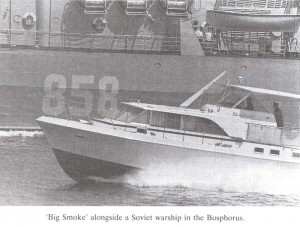
(Photo of Big Smoke, a motor yacht used by the U.S. Navy’s Task Force 157, for intelligence collection operations in the Mediterranean. Photo from Jeffrey Richelson, “Task Force 157: The U.S. Navy’s Secret Intelligence Service, 1966-77,” Intelligence and National Security 11 (1996), 118; it is used because I had to buy the article for $34 bucks and I only spent the money because..well, you now.)
It is five-thirty at the farm. Time to get back up North and attend a meeting which will have the participants furtively looking at Accuweather on their mobile devices, waiting for the snow to come it. It is my fault. I declared Winter over last week, and now we are all going to pay for my folly.
We have had some fun with Big Smoke, and I wanted to pay tribute to him now that he has gone on to the Big Task Force in the sky. He told me those two tales of long ago: during the Occupation of Japan, and in the Cote A’Zure, which now seem as distant as the lunar surface.
You have seen the slide show of the modern marvels that are Hiroshima and Nagasaki today, juxtaposed with the images of the former Arsenal of Democracy, my home-town of Detroit, Michigan.
As I said, like going to the moon. Now that Mac Showers and Big Smoke are gone, there are many holes in the story. Mac trusted me not to disclose some of the stories he told me. There are a couple of them that are quite hysterical, but could damage reputations even this long after the fact, and that is something that he wouldn’t do and neither will I, though I will continue to chuckle about one the resulted in the future Admiral hiding under a piano for the night.
Mac served with Big Smoke in London on the staff of CINCNELM, though relations would have been proper and distant between Commissioned Officer and Enlisted member.
He certainly knew him later, and crossed paths many times in the course of their subsequent careers. Big Smoke got his commission, in the mid 1950s, though I do not know the date with any precision. He tried to continue what was considered a balanced career path of Fleet and Shore commands, but it did not work out that way.
His time in counter-intelligence and law enforcement made him a rarity in the officer corps. While the Office of Naval Intelligence was entrusted with command of the Naval Investigative Service (forerunner of today’s television-ready NCIS) the backbone of the agent force were career civilians. As an Intelligence Officer, one tour with the NIS was not necessarily a career ender, though two would have people looking at you funny, unless the second was as the Commander.
I have written extensively about Mac’s experience with that special breed of Naval Officer like code-breaker Joe Rochefort, or Mac’s good friend Rufus Taylor, who like Eddie Layton and Marine “Red” Lasswell were ordered to study the Japanese language. Most of them were not intelligence officers; like Mac they were from the Deck community.
It was only after the war that the requirements for Air Intelligence personnel and cryptologists created a surge in numbers in the restricted line intelligence communities. There was no room in the Cold War Navy for language specialists of that order; the soviets would hardly have permitted that. The art of spying- or let’s call it “close observation” languished except for the small cadre assigned to Attaché duty.
By the time of the Cuban Missile Crisis, it was just about moribund. The only officer who was actively engaged seemed to be Hal Feeny, the Base Intelligence Officer at GTMO.
In the chaotic aftermath of the failed invasion at the Bay of Pigs, the Navy was blasted by AG Bobby Kennedy for its poor performance. His acid inquiry was about why there had been no systematic debriefing of Cuban workers on the base, who were able to come and go through the wire and travel freely in the newly Socialist island.
The man picked to travel to the island to establish a human intelligence capability was Tom Duval, who got right to work, puffing on one of his trademark stogies. The result was Task Force 157, which was either a low-budget scheme to support the Fleet, or a crazy aunt that became a means for the IC to go a little nuts.
I swear, we will end this naval gazing tomorrow, and get to the carpet-bombing of the capital that has come with Sequestration. Here is how Big Smoke’s next career started, from SECNAV, circa mid-1960s:

Copyright 2013 Vic Socotra
www.vicsocotra.com
After Action

I am often asked if I have served various places around the world, and how many languages I spoke. However, maybe on this occasion, it was good that I didn’t know one word of French. Had I known, I may not be here today.
We arrived at the Gar du Nord station in Paris on New Year’s Eve, 1952. Considering how long ago it was, it feels as fresh today as it was then.
Special Agent Christides said I was invited to one of the Inspector’s homes for New Year’s Eve Celebration and could I attend, and I said, “Of course I will.” It seemed like a splendid way to wrap up a successful operation.
Christides picked me up late in the afternoon at my hotel and he drove the Citroen outside of Paris to a beautiful big old farmhouse in the countryside. The trip took a few hours, and we stopped at a little inn to fortify ourselves against the cold. I think we arrived about 2100 in the evening.
There was a very large group at the house, which was furnished in rustic old furniture. The Inspector who owned the place- Richard?- came up and started speaking to me in perfectly serviceable English and had a pitcher in his hand. I thought was fruit juice until he poured me a drink. I don’t think my eyes got straight the rest of the evening. Typical French, when we were working with them they would only speak French, but when it was pleasure or something like this, it was surprising how well most of them spoke English.
After a wonderful New Year’s Eve dinner, and finally about 3:00 a.m., I told Christides, “I have to get back to the hotel and get my goods, I have an 0800 departure from the MATS terminal to go back to Washington.”
He looked at me owlishly and we gathered our coats to bundle up for the journey on the dark country roads to the bright lights of Paris.
As I stepped out on the top step of the upper floor of the farmhouse, my feet slipped and I fell (it had nothing to do with the Brandy, as it had been snowing) all the way down the stone stairs and landed flat on my back.
I was sufficiently lubricated that I felt fine, as though nothing was wrong. Christides sobered up well enough to keep us on the road, and dawn was coming up as we got downtown. I checked out of the hotel and was dropped at the MATS terminal in time to make the prop transport for the flight back to Washington.
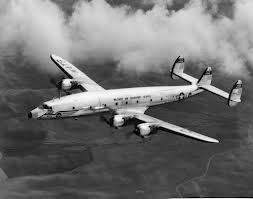
After about three hours in flight I started feeling what it was like when the fruit juice effect ran out and I began to have stabbing pain in my chest and back, and presently it radiated throughout my body.
When we arrived back in Washington, I was met by two agents from the District office who had been waiting for me. I told them my problem.
They took me to the Navy Yard. Sure enough, I had three cracked ribs and they wound enough tape around me that I thought it would cause a shortage in the dispensary.
The following day I went in to the Pentagon and briefed Admiral Espe and several other officers, about what had happened and gave him the letter with the kudos from Christides and the Surete’ on the successful operation.
The DNI thanked me for a job well done, and I made the rounds of the other offices that had an interest. I briefed Bill Abbott, who recognized that Naval Intelligence required a Human Intelligence component, which had been allowed to atrophy since the end of the war. Bill sat me down and for the next two days and supervised and edited my report.
It was pretty much the way you see it above, but if you were wondering about my personal life, I will tell it to you this way.
The next time I went to Paris I had a meeting with some of the old gang. I saw Christides, and he unwrapped the last riddle from the operation against the Corsicans.
“Monsieur Duval,” he explained it to me, “Did you realize why we kept asking you whether a sailor of French descent knew any French?”
“No, I wondered about it at the time. Did you think ONI was keeping secrets from you?”
“Met non, Monsieur.” He laughed. “Of course we trust you implicitly. But the reason is that each time the Corsicans set you up with those lovely ladies there was a simple purpose. When a beautiful woman whispers sweet nothings in your ear late at night and you react to what she says in French, they would have known you were a fake. You would have never woken up the next morning. They would have been sure you were a Surete’ insert, and then they would have killed you.”
I had to think about that for a while. Sometimes I guess ignorance is bliss.
It was good to hear that a few months after the Nice project started, the printing plant in Marseilles was raided. In addition to many arrests a massive amount of United States counterfeit currency was confiscated. It had been the money machine for a political party in France that I will not name.
The Surete’ had given me a sheet of $10, $20 and $50 U.S. notes, marked counterfeit, suitable for framing. I took it back to London and made the mistake of showing it off.
It was immediately confiscated by a Senior Officer, who explained haughtily that “an enlisted man should not have something like this in his possession.” Welll, I bristled at that, but what can you do?
During the years after that when I was stationed in London, even though NATO had moved out of Paris I never had any problem finding out what I was looking for in France. My friends at Suete’ were amis for life.
It all comes down to working the street and developing contacts, no matter if you are working criminal, counterintelligence or HUMINT. It is not about just sitting behind a desk and shuffling reports.”
So ends Big Smoke’s official report of operations conducted long ago. Working the street was something that Tom Duval did very well indeed. With all his enlisted time he was able to retire at twenty years as a Lieutenant Commander. It was just in time for something else, something really important that was much more than an active duty 04 could handle.
But maybe a highly placed Navy civilian could. More on what Big Smoke did not talk about tomorrow.
Copyright 2013 Vic Socotra
www.vicsocotra.com
Hors de Combat
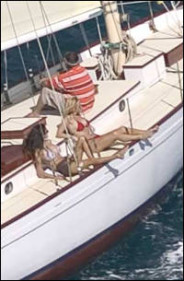
This is the third and penultimate episode of Big Smoke. I hope to do a brief appreciation of the organization he served, and how Naval Intelligence acquired and divested itself of a Human Intelligence capability. Which included yachts with topless female crewmembers to deflect resistance to close-aboard passes of Soviet warships for important collection missions.
But I digress. Without further ado, here is the conclusion to Big Smoke’s adventure with the Corsican mob:
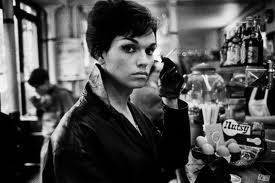
“After we struck a deal for five grand in exchange for a wad of counterfeit greenbacks, it was another fine evening and another new lady I had never met before. She was nice, but I decided to call it an early evening since but I was working and had to get up early to get to the Gare de Nice Ville and take the train to Paris.
Again, boarding the train and getting off was the same routine with the Surete’. They certainly always cleared the decks very carefully before any movement was made.
Back in Paris, I went to Surete’ headquarters. They took me to a vault where there must have been a fortune in counterfeit currency and they said they would try and find the best. Particularly, it had to be the best quality paper because the buy would probably be made at night and the supplier would do it by the feel of the paper. They said they had some very good currency, maybe the printing wasn’t that exceptionally good, but the paper was outstanding.
It was bundled up for me to take back to Nice to buy counterfeit with counterfeit, probably for good French business reasons. No sense in wasting the real stuff, though I was a little concerned about what would happen to me if the Corsicans had a chance to look at the money in good light.
When I returned to Nice, we had it set up to have the cab driver stop at the bar first thing. Sure enough we were as lucky as we could be. Albert was there, big as life sitting at a little table on the sidewalk, and I opened the door and said, “Come on with me to the hotel. I have to change and I want to show you what I’ve got.”
“Sure thing, Buddy,” he said with his New York accent. He got in the cab with me. We went to the hotel, because what I wanted him to do was to make sure he saw me put the package in the hotel safe. That evening we went to dinner, this time no ladies, just dinner, and later we got into Albert’s Citroen and drove up and down the city streets and alleys. To me it seemed like a cheap movie I was watching, with me as the Eddie Constantine character.
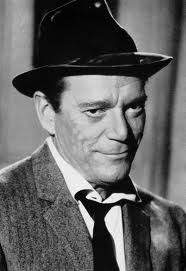
(Eddie Constantine)
Finally we stopped on a dark alley with cobblestone pavement. A guy jumped in the back with a big package and off we went again.
Now, the Surete’ had always assured me that no matter where I went or what I did, I would be in their view and I had nothing to worry about.
I asked Albert to stop the car under a streetlight so I could see the contents of the package. I opened the wrapper and examined the contents carefully. It looked very good and I said “Albert, this looks very good. I think we have a very good deal.” I folded the paper back together and held the bundle of fake greenbacks on my lap. “I have to go to the hotel and get the money out of the safe to pay you,” I said, and He gunned the engine, eager to complete the transaction.
There was a lot of chit-chat between Albert and the goon in the back seat that I could not follow, but I was on edge. If they tumbled to the fact that I was paying in fake dollars for other fake dollars I might very well be found floating in the harbor, and I did not want to have to go Eddie Constatine on them.
When we arrived at the hotel, I got a very uneasy feeling because there was nothing to indicate that the Surete’ detail was around. Still, there was nothing for it but to be bold. I ambled along and got the package from the desk clerk, and with the bundle of bills in my hand announced that I was getting a chill and told Albert, “I need my pea-coat. Back in a second.”
He tried to stop me, but I rushed upstairs and got the heavy wool coat, banging the door and doing everything I could to make sure that the agents knew the deal was going down, but when I walked down the stairs to the lobby there was still no law enforcement in sight.
As Albert and I went out the front door, I knew that going Eddie Constantine would be a challenge. I could take Albert, I thought, but the goon in the back seat would be the wild card. I had no idea how big he was, or what weapons he was carrying. I was starting to get a little nervous, since if Albert got a good look at my cash, I was going to be dead meat.
However, just as we came out of the hotel, it was gang-busters. It seemed like from every direction the Surete’ team arrived, made the arrest, and dragged us all down to the Nice police headquarters.
Albert and his goon were given the full treatment by the Surete,’ and I fully expected I was going to get the third degree as well to ensure that it looked plausible and that I was not part of a set-up.
It wasn’t long before I was escorted out and taken back to the hotel and told to get a good nights’ sleep. Christides said: “You need it, Ami. Bon Nuit.”
I had to agree, and I did.
The following evening, the team and I had a nice dinner, very happy with what had happened so far and the next day we headed back to Paris.
We arrived there on New Year’s Eve, 1952. Considering how long ago it was, it feels as fresh today as it was then. I was just grateful I had no reason to try to act like a movie star.
I will have to fill in the loose ends that every case has tomorrow. I need my beauty sleep.
Copyright 2013 Vic Socotra
www.vicsocotra.com
The Farm Report
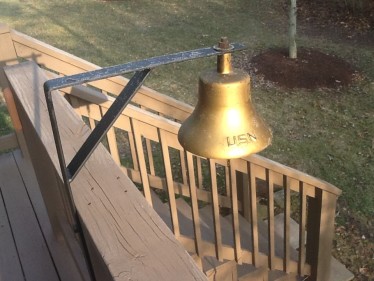
Sorry- I was going to complete Big Smoke’s tale of counter-intelligence on the Cote D’Azur this morning, but for a variety of perfectly good reasons I got involved in an editorial project that was going to take too much time and I blissfully dove into it so I would not have anything hanging over my head the rest of this gray day down on the farm.
Big Smoke’s story can wait till tomorrow morning, and the reason I am here is to check on the status of the latest round of projects. Don-the-Builder and Tom-the-Awning-Guy did yeoman’s work during the week and I should be just about ready for spring, should it ever come.
I have been dragging this ship’s bell around since we left the house on Hawthorne Street in Birmingham, Michigan, in 1968. It was high time to hang ‘er high, so to speak, and now it is proudly positioned adjacent to the side door in order to have a means of signaling important events, without screaming to the Russians next door. It is a massive thing, and it seems happy to be outdoors and functional again. It will additionally enable me to signal the proximity of icebergs and other hazards in the night and I know the neighbors will appreciate it.
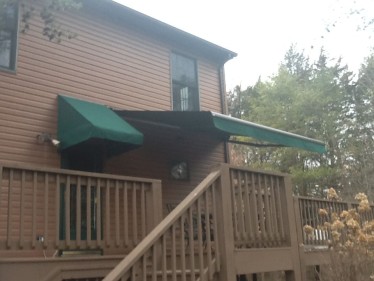
The fixed awnings remain fixed. What is new is the motorized awning that swings out on a roller-furling device like the Genoa on a sloop. It is pretty cool, color is right, and should enable drizzle-free drinking come the day when the buds are ready to open and the azaleas are starting to bloom. That is the plan, anyway.

This is the pièce de résistance, the new cabinet with the antique-glass doors and the new island/peninsula that should enable me to free up some counter space and make cooking fun again.
There are plenty of drawers and nooks on the other side of the fixture, which is a blessed relief. All the instruments of mass culinary destruction are currently out in the open. That had to end.
So, with the internet upgrade on Monday, we bring this round of home improvements to an end. It is about time, and symbolic that my little binge of spending will terminate with the 2% cut to the Federal Budget.
I have managed not to think of that since I cleared the Capital Beltway, and I think you would agree that our little journey with Big Smoke to quainter times has managed to stay clear of the toxic politics Up North.
I think it is probably good to leave things right there for today, wouldn’t you agree?
Copyright 2013 Vic Socotra
www.vicsocotra.com
La Tete de Maure
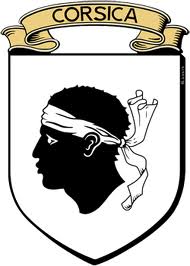
Reader’s Note: The world ended this morning. Sequestration is in effect. Accordingly, I have scheduled meetings in distant Fairfax County through the day in case the capital spontaneously combusts. We are still twenty days out from the official start of Spring and have no Pope at the moment, but I am going to treat the beginning of March as if we have put the gray days of winter behind. A new conclave will produce a fresh Bishop of Rome just as the earth will render a new green season.
This is part three of Big Smoke’s tale of a clandestine operation on the Cote D’Azure a long time ago. I have done to this narrative what I did to his tale from the Occupation of Japan: the narrative is exactly as he wrote it, but smoothed and contextualized. It is a tribute to a tough guy and his interesting times. We will finish it up tomorrow. I can only ignore the stupidity in this town in these times for so long.
Big Smoke continues:
_________________
“I slept a bit in the afternoon, luxuriating in the unaccustomed luxury of the hotel near the strand in Nice. It is a lot different than an enlisted rack on a ship, or a shared room in a BEQ. Daylight in January is thin this far north, and the shadows were lengthening as I looked at my watch and saw it was after 1600. I got up, splashed some water on my face to wake up and decided I could use a shave. Then I got organized and shrugged on a sport jacket over my chinos, loaded a fresh pack of Luckies in the inner pocket and walked down the steps to the street.
I thought about what the Surete’ officers had told me on the train trip down. The Corsicans were an interesting bunch. The Uinione Corse was active in just about every crooked game in the south of France. During the war, they had cut a deal similar to the one Lucky Luciano cut with the US Navy: they provided law and order against Nazi sympathizers on the docks in Marseilles and elsewhere along the coast. They also branched out into heroin, money laundering, prostitution and counterfeiting.
After the war, they had the tacit support of the French government to suppress the communist unions that were striking for higher wages, and there was an uneasy form of official sanction that the Surete’ intended to undermine.
I looked up and down the avenue, at the smartly dressed people and whizzing little cars and decided to follow the street toward the ocean and kill a little time. I needed to get oriented before I tried to approach the bar where the Surete’ told me the Corsicans hung out. I sauntered down the Avenue Felix Faure away from the port, and in a few blocks came to the grand avenue along the beach, the one you see in the postcards. It is called “Les Prominade des Anglais” and I stood and smoked and looked at the lovely azure sea.
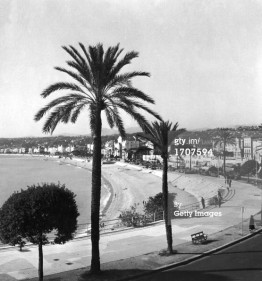
(The Prominade des Anglais along the beach in Nice. Photo Getty images.)
In January, the temperature only gets up to around 50 degrees on the coast, Fahrenheit, since even after all these years I can’t make head nor tail of centigrade. There were a few people on the beach, but nothing exiting like I had heard about from shipmates who had deployed in the high summer. Apparently the French gals really put on a show. I ambled along the Avenue to where it turned into the Quais des Etat- Unis and cut across the street to walk through the Parc du Chateau toward the harbor. Mothers pushed prams and old men sat playing chess on benches. The people looked sleek and relaxed. The War had left Nice pretty much untouched and the citizens reflected it.
North of the park there were rows of three and four story apartment buildings with shops on the ground floor. I checked the name of the bar they had told me to investigate, memorized it, and balled it up and deposited in a waste can on the street. About a block away from the ship basin, the business was a little seedier and the restaurants tended to be ethnic.
The one I was looking for was called “La Tete de Maure,” or what the Surete’ told me was “The Moor’s Head,” the symbol of Corsica. When they stopped yacking in French, they had told me that and some other information about why the Corsicans had so much influence on the Cote D’Azure. I swallowed, put on my very best Sailor-on-liberty grin and prepared to walk past the bar.
As I wandered past the bar, someone called out in very good English, saying: “Come on in mate, and have a drink!”
I walked in and that was where I met, let’s call him, ‘Albert D.’ He said he was from New York, had been in the military, and wanted to be close to his Corsican relatives. We had a couple of beers and I tried to get a good view of the space and asked where the head was.
“The what?” he asked. “The Moor’s Head?” Albert looked puzzled.
“No, the Latrine,” I said. He pointed back towards the rear.
I walked past an open door and looked in; there was a group around a table playing some kind of a card game. I thought for sure I saw some sawed-off shotguns stood up on their butts against the wall. When I came back and I looked again I saw that there certainly were weapons there and told Albert I noticed several shotguns and he said, “Oh yes, they like to shoot pigeons.”
Pigeons, I thought. Shit, I am the pigeon in this caper. I polished off my wine and then told Albert I needed to get back to the hotel and get a little rest.
Albert said “Fine, but please, come join me tonight for dinner. We can talk over life back in the States. It is good to have an American voice to listen to.”
“Roger that,” I said. “I have plenty of leave left. I will be around.” Then, back to the hotel I went to make my report.
I shut my door and the Surete’ opened their to have a council of war. They were not so sure they could have been so lucky as to get in with the Unione Corse immediately upon our arrival. That commenced a fair amount of apparently heated discussion and a long dissertation I could not understand as to what they needed, what they wanted, and how I was to deal with things.
Specifically, they told me in English, they wanted name, rank and serial numbers about everybody I met. That plus phone numbers, license numbers, anything that they could get a good handle on.
When I mentioned Albert, one of the inspectors perked up. He took out a book, checked and said, “Oui, he is a deserter, U.S. Army. There are several hundred in the South of France right now, but we don’t bother them unless they get into trouble. If they do, we throw the book at them.”
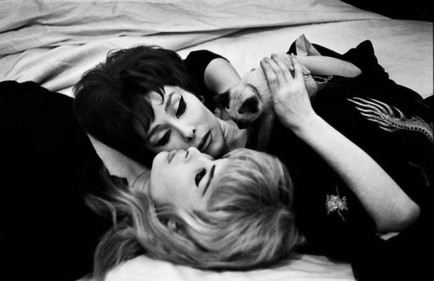
Then followed two nights of getting together talking to Albert and the Corsicans, shooting the bull, getting to know them. Two different nights I had two different lady friends and it was very nice company, but always by midnight I would make an excuse that I had to get back to the hotel. When I got back to the hotel, there were two or three hours of interrogation about what I had seen or heard for the evening. This included looking at file photos and making identification of members of the Corsican gang, which included the ladies I had met.
Since I could not remember names and numbers so well, I got the idea to shave the calf of my leg and I made a few notes on it when I went to the head to try and jog my memory about what I had to tell the team when I got back. By the second day, even the group in back playing cards, seemed to get very friendly.
By the third day again I was to meet Albert and go out for an evening of fun with the ladies. The team decided to move ahead and they said since things were going so well, now was the time at the right moment. During the course of the evening when you feel the moment is exact, I should just ask them “How does the queer go?”
Now, that is a curious phrase, and could be taken a couple different ways. You know what old Winston Churchill said about the traditions of the Royal Navy- those being Rum, Sodomy and the Lash. I looked at the Surete’ agents with suspicion. In the master-at-arms trade they are always chasing queers one way or another- and that was an important part of counter-intelligence, too, since the homosexuals were subject to blackmail.
“No, no, Monsiuer Duval. We do not call homosexuals ‘queers.’ Les homos is one term, but we do not call them l’etrangers.”
Albert will know what the ‘queer’ means, and where it is going.
I wasn’t certain about that, but later in the bar, seated next to Albert, I said the words. He sat up straight, immediately alert. He looked over, his eyes hooded. “How much are you looking for?”
At that point, I knew we were in. I explained to him the reason that I had to leave was that the SUPPO paymaster on my aircraft carrier was a very good friend of mine. He was out to make a buck, if he could, and with the Navy having the only real greenbacks in all of Europe, this was a real opportunity to cash in on circumstance. “He thinks that if we could get a hold of some good counterfeit currency we could really make a bundle.
Albert asked “How much are you looking for?”
I told him that it had to be exceptionally good, all with different serial numbers, and we would like it in 10s, 20s, and 50s and probably $50,000 for the first buy. I said “If this works well, then before the ship trans-Lants back to CONUS we will make a substantial buy to take back with us. No customs inspection, or at least only a cursory one to beat.”
Albert considered my proposition.
I lit up a Lucky and breathed smoke. “I will need to know the price, since the ship’s paymaster will be in Paris drawing U.S. cash and I am going to have a meeting with him, so I need to get the cash quickly, otherwise it will be a long time to wait for the next chance to tap into the money stream.”
Albert rose and walked toward the rear of the bar. He was gone for a while then came back and said, “It’s no problem. I can get it for you, but it’s going to cost you $10,000.”
“That is bullshit, Albert, come on. I don’t have that kind of money up front. Help a sailor.” It took a glass of absinthe to get into some serious negotiation.
“OK,” he said, presently, finishing his glass of the green poison. “I can do five grand.”
“I will see what I can do,” I said, and we shook hands to seal the deal.
Copyright 2013 Vic Socotra
www.vicsocotra.com
